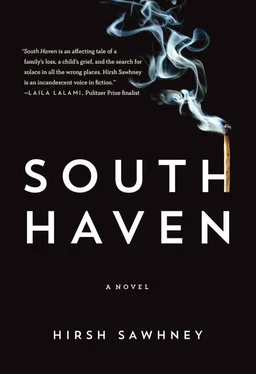“Sharon, I can tell when people are lying.”
“Don’t believe me. What do I care?”
Whenever Arjun called to check on Siddharth during the first days of September, he refused to say hello to Mohan Lal. Arjun said he didn’t have time to rehash a bunch of bullshit with a closed-minded bigot. The situation frustrated Siddharth, especially because his mother would have wanted him to fix it. He pleaded with Arjun to make up with their father, and Arjun eventually relented.
By the first week of October, Arjun and Mohan Lal were talking once a week. This truce pleased Siddharth, at least at first. But soon they were speaking several times a week, causing him to feel pangs of jealousy. He began listening in on their calls, to find out if they were exchanging declarations of love or secrets about his progress at school. He needed to know if Mohan Lal was telling Arjun about a covert plan to marry Ms. Farber.
Each time he eavesdropped, he was relieved — and also annoyed — to discover that they were just going on about India. Mohan Lal called Gandhi a “traitorous homo,” a stooge who had “let the British chop India in two,” whereas Arjun said that “the Mahatma altered the course of modern politics.” Arjun said, “Don’t you get it? If you fight force with force, then the violence never ends.” When he called the Indian Congress Party a “truly progressive political party,” Mohan Lal said, “Bullshit. It’s a criminal organization. How can a party be progressive when it murders innocent Sikhs?”
“So it’s okay to kill Muslims?”
“Did I say that?” asked Mohan Lal.
“It’s what you’re implying, Dad. You’re starting to sound like some sort of Zionist.”
“What’s wrong with that? Son, the Israelis have done quite well for themselves. Thanks to the Jews, an impoverished desert is now a blooming civilization.”
“I’d talk to a couple of Palestinians about that. I’d look up the word oppression in the dictionary.”
Many of their debates led back to Israel, and Siddharth couldn’t fathom why his brother had such a problem with that country. Andy Wurtzel had gone there the previous summer, and he got to drink in bars and go spelunking. Andy had also reported that Israeli girls gave good blow jobs. When Siddharth tried to ask his father about Israel, Mohan Lal was dismissive. He said, “For now, just focus on your studies. One leftist son is enough.”
Mohan Lal was in his own world as summer faded into fall. He was always working on his new India book, or reading some paperback or magazine from India. He had taken to pacing around the house with an old tape recorder, sometimes listening to cassettes of motivational speakers provided to him by Ms. Farber, but usually studying recorded political speeches in Hindi. Barry Uncle acquired these for him on his frequent business trips to Delhi.
Mohan Lal kept listening to one particular politician over and over again, a woman who sounded rather manly. Ms. Farber said the woman sounded so passionate, and Mohan Lal explained that her life was truly inspiring. She had been born a pauper, but thanks to the BJP, she had managed to make a success of herself in one of the most backward places on earth. Siddharth hated these tapes, which he found scratchy and whiney.
Mohan Lal sometimes went to meetings with Barry Uncle and other BJP supporters, and one time, Barry Uncle said it would be a good idea if Siddharth came along. Siddharth protested at first but gave in upon finding out that the meeting was being held in a Fairfield home whose owner possessed an actual Lamborghini. When they finally made it to the place, it turned out the Lamborghini was in the shop, and Siddharth had to spend two hours sitting around while some hairy-eared Indians drank cans of Coors Light and droned on in Hindi about politics. They talked about the same things over and over — Ayodhya and Advani, and Hindus being proud to call themselves Hindus. Once the political discussions were over, they all sang a song in Hindi — or maybe it was a prayer. Siddharth wasn’t sure, but hearing the men sing together made him want to vomit.
On the car ride home, he said, “Dad, this BJP crap is so stupid.”
“Son, this stupid crap just might change the world.”
“I thought Hindus were weak, Dad. I thought Hindus didn’t have backbones.”
“Precisely, son. That’s what I’m trying to change. I am being the change that I want to see.” Upon uttering this sentence, Mohan Lal chuckled to himself.
Siddharth didn’t get what was so funny. All he knew was that his father was a hypocrite.
* * *
When Mohan Lal wasn’t working on his book, he was preoccupied with finishing up his application for tenure at Elm City College. Everything about the application put him in a bad mood, like using a typewriter to fill out countless lengthy forms. The most difficult part of the tenure process was getting original copies of his Indian degrees, which resulted in several calls to Delhi University, and even a phone consultation with an Indian lawyer. After these phone conversations, Mohan Lal snapped at Siddharth about cleaning up his room or doing his homework, about turning down the television so that he could focus on his work. Eventually, Barry Uncle stepped in, placing a call to a politician friend in India. A few days later, Mohan Lal’s degrees arrived via DHL. Siddharth was impressed with Barry Uncle. Yet he was anything but pleased with his father.
Even though Mohan Lal was stressed all the time, staying up late and sleeping in, he still managed to be such a kiss-ass with Ms. Farber. Whenever she cooked something, even if it was horrible — like her salmon cakes — Mohan Lal told her that dinner was delicious before locking himself in his office. Mohan Lal, who hated “brownnosers,” was himself being a brownnoser, and Siddharth knew why: his father was being a brownnoser because he was addicted to Ms. Farber’s pussy.
Siddharth wanted to remind his father that he was more important than a piece of pussy. He tried doing small things to demonstrate that he was the most valuable person in Mohan Lal’s life. But when he offered to type up his dad’s handwritten pages, Ms. Farber said she could type much faster. When he checked Mohan Lal’s manuscript for spelling mistakes, Ms. Farber rechecked the pages afterward, even though he had done a fine job on his own.
Ms. Farber went way too far with her editing. She not only made comments about Mohan Lal’s writing style and vocabulary, she also told him to rearrange sentences about Stafford Cripps and Lord Mountbatten. Siddharth thought this was ridiculous, since she hadn’t even been to India before, but when she made these suggestions, Mohan Lal beamed. He told her that she was a genius. He told her that she should leave psychotherapy and go into publishing. All this gushing nauseated Siddharth.
He started keeping a written tally of the annoying things that she did in one of his old sketchpads that he rarely used for actual drawing anymore. Thanks to Ms. Farber, anyone who entered the house had to remove their shoes in the entranceway. The sandwiches she prepared for his lunch were served on dark-brown bread that tasted like cardboard, and she stuffed them with disgusting things like sprouts and hummus — pussy-ass poser food, according to Marc.
An especially annoying thing about Ms. Farber was the way she took pleasure in meddling in his personal life. Once, when Siddharth had gotten off the phone with Sharon, Ms. Farber said something about Sharon not being the right type of friend. Siddharth said, “What’s that supposed to mean?”
“Things are pretty complicated for Sharon,” replied Ms. Farber. “I’m not at liberty to divulge the details — just trust me on this. Sharon has a difficult situation.”
Читать дальше












